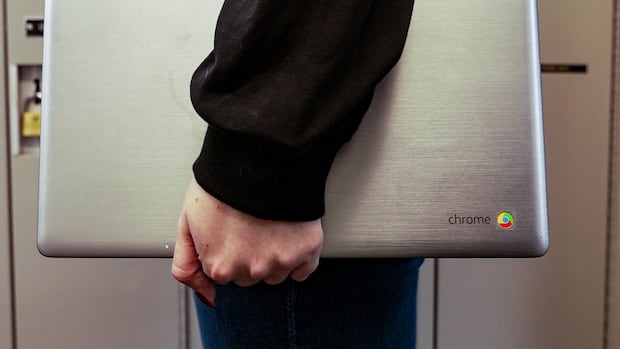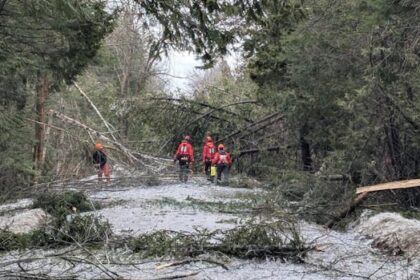Nova ScotiaTimestamps on the computer showed that messages were accessed both at home and at school.RCMP’s Internet Child Exploitation Unit (ICE) is now investigatingBlair Rhodes · CBC News · Posted: Nov 25, 2025 5:00 AM EST | Last Updated: less than a minute agoListen to this articleEstimated 8 minutesThe audio version of this article is generated by text-to-speech, a technology based on artificial intelligence.How a school Chromebook became a gateway to exploitationAfter finding questionable emails and chats on her daughter’s school-issued computer, a Nova Scotia mother is sounding the alarm about vulnerabilities in tools used regularly by students across the province. The CBC’s Blair Rhodes explains.A Nova Scotia mother says her 14-year-old daughter was targeted by online predators through a school-issued laptop and is warning other parents to be vigilant. The woman noticed the problem in October, when she said she found questionable emails and chats on the Chromebook computer.“Things that were very sexual in nature, self-harm related; some conversations with individuals who were not within the school system that were happening over her school-issued email address,” said the woman, whom CBC News is not naming to protect her daughter’s identity.Timestamps on the device showed that these messages were accessed both at home and at school.The mother took the computer to the RCMP, and the Internet Child Exploitation Unit (ICE) is now investigating. She said she became concerned after noticing some cuts on her daughter’s arms.“[I] had no idea that there was somebody kind of grooming and convincing her to do these things.”A Nova Scotia mother says her daughter was targeted by online predators on a laptop issued by the school. (Photo illustration/CBC)Halifax Regional Police recently issued a warning to parents about an online group targeting youths called 764, which is a subgroup of the larger Com Network. The group uses the chat feature of platforms like Discord, Minecraft, Roblox, Telegram, Twitch and Steam to connect with vulnerable young people in order to exploit and manipulate them.The woman said she pulled her daughter out of school and has been home-schooling her ever since. She said her daughter is doing well, with help from therapy.’Genuinely shocked’The woman said she is concerned about whether her daughter sent any images of herself to anyone. “We’ve had those conversations, was there anything sent? I’m told no, but again these groups have an extreme ability to brainwash and coerce and convince these kids to do things that they may not do or could even be embarrassed about falling for and doing. “So I hope not, is all I can say.”Schools across Nova Scotia provide students with Chromebook laptops. Rules vary on where and when the devices can be used. In some regions, students are free to take their computers home. Other locations restrict their use to school-use only. All regional centres for education in the province told CBC News they have “robust” safeguards on their student-issued laptops. But they cautioned that when a computer is taken home, it’s reliant on whatever safeguards are built into the home Wi-Fi. However, the mother in this case said timestamps on her daughter’s Chromebook showed she was accessing the problematic websites during school hours.In addition to handing over her daughter’s laptop to the RCMP, the woman also contacted the school and the centre for education.“They acted genuinely shocked,” she said. “They acknowledged that my daughter was kind of in a more vulnerable group, that she would be more susceptible to something like this. They advised that they had no idea that these things were happening within the school.”Exposed to predators through RobloxThe school subsequently issued a warning email to parents. “It has been brought to our attention that students have found a work-around on the school Chromebooks and are able to access sites such as Instagram and Roblox,” the email reads in part. “We are investigating to figure out how this is happening as Roblox has been identified as a site of concern where strangers may chat with kids.”Roblox is an online gaming platform with a chat feature. It was through those chats that the girl was exposed to the online predators. Last week, Roblox announced new safeguards on its site as the company continues to face criticism and lawsuits over child safety, and a growing number of countries and jurisdictions are implementing age verification laws.764 and its related groups draw inspiration from a neo-Nazi movement called the Order of Nine Angles (O9A). (CBC)The mother says her daughter is more vulnerable because she has severe ADHD. Prior to this incident, the mother says she had carefully policed her daughter’s access to the online world, including putting restrictions on her cellphone.“There were times when I felt like I had over-parented her, where she was missing out on certain social interactions with her friends because they all had social media and they were all able to relate in that way, which is so common these days,” she said.“And looking back I’m glad that I did. But at the same time it still feels like I missed something.”Student safety a priority: provinceIn a statement, the Nova Scotia Department of Education and Early Childhood Development said it was aware of this incident and has contacted the RCMP.“The safety of students is a constant priority, and we are committed to working with families and other partners to protect children and youth from online harms,” the statement reads.“Many schools proactively send information to families about safe use of school-issued technology while at home, including supervision needs and links to additional resources.” All districts, and the department, in responding to CBC’s requests for information, provided links to websites with advice on how to avoid online dangers.The RCMP have obtained warrants to extract data from the girl’s Chromebook. Their extraction may reveal the identities of “Gracie” and “Cole,” the names of two predators who targeted her.Laptop use by school region across Nova Scotia Information provided to CBC News by each school district:South Shore Regional Centre for EducationGrades 3-12: Chromebooks provided (no device-to-student ratios provided).Grades 3-6: Devices stay in homeroom classroom.Junior high: Permission required to take device home.High school: Students allowed to use own device.Safeguards in place using secure school log-in including website/content blocking and safe search. Some safeguards are only in place while on school network.Tri-County Regional Centre for EducationGrades P-6: One Chromebook for every three students.Grades 7-9: One Chromebook for every two students.Grades 10-12: One Chromebook for every student.Schools decide how devices are stored and signed out.Most schools keep Chromebooks in classrooms.Some high schools students allow devices to be taken home.Some schools allow short-term sign-out.Safeguards in place using secure school log-in including website/content blocking and safe search. Some safeguards only in place while on school network.Security tip sheet accessible to parents.Cape Breton-Victoria Regional Centre for EducationAll students have access to Chromebooks.Grades P-5: Chromebooks stay in classroom, with exceptions.Grades 6-12: Students allowed to take devices home. Family assumes responsibility for security at home.Safeguards in place using secure school log-in including website/content blocking and safe search. Some safeguards only in place while on school network.Annapolis Valley Regional Centre for EducationElementary students have minimal access to Chromebooks.Grades 6-8: Chromebooks used mostly at school.Grades 9-12: Chromebooks are used for schoolwork and can be taken home.Students learn about online safety and privacy.Some safeguards only in place while on school network, including Roblox, TikTok, Discord.Students can’t install apps that are not pre-approved.Chignecto Central Regional Centre of EducationGrades P-6: One Chromebook for every two students.Grades 7-12: One laptop or Chromebook for every student.Devices expected to stay on school property.Some schools keep a small supply of devices for signing out.Safeguards in place using secure school log-in including website, content and app blocking. Some safeguards only in place while on school network.Real-time security monitoring on- and off-site via Microsoft 365 Defender.Students learn about online safety and privacy.Strait Regional Centre for EducationSchools decide device availability to students.Grades 10-12 generally allowed to take Chromebooks home.Network-specific safeguards in place while on SRCE networks, including traffic logging.Safeguards in place using secure school log-in including website, content and app blocking.Halifax Regional Centre for EducationElementary: One Chromebook for every three students.Middle school and junior high: One Chromebook for every two students.Senior high: One Chromebook for every student. Some schools provide Chromebooks to students for entire school year. Other schools have a sign-out option.Network-specific safeguards in place while at school. Safeguards in place using secure school log-in including website, content and app blocking. Some safeguards only in place while on school network.The following resources are available for more information and support:https://novascotia.ca/cyberscan/https://needhelpnow.cahttps://cybertip.caRCMP fact sheet on violent online groupsKids Help Phone: 1-800-668-6868. Text 686868. Live chat counselling on the website.MORE TOP STORIESABOUT THE AUTHORBlair Rhodes has been a journalist for more than 40 years, the last 31 with CBC. His primary focus is on stories of crime and public safety. He can be reached at blair.rhodes@cbc.ca
N.S. mom alarmed after teen targeted by predators on school-issued laptop











